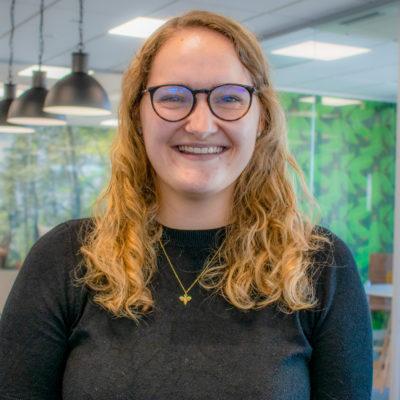There are plenty of research publications warning against the negative effects that social media can have on mental health. Despite this, many who struggle with their mental health use Twitter and other social media sites for support and to talk to friends and strangers who are having the same experiences. Social media allows for emotional support, personal expression and health information sharing. The latter is supported by a large healthcare professional (HCP) community online, sharing resources, discussing research and engaging in conversations with both HCP peers and non-HCP patients. This happens across therapy areas, each with their own hashtags: pathologists discuss new research using #pathJC and cardiologists converse using #CardioTwitter. Using CREATION Pinpoint, we isolated the voice of psychiatrists on Twitter who were promoting mental health awareness, encouraging individuals to speak openly about their wellbeing, supporting patients online and guiding conversations.
Over a period of 15 months from January 2018 to March 2019, CREATION Pinpoint identified 1,319 psychiatrists across the UK and US (680 and 639 authors respectively) who were discussing mental health on Twitter, authoring a total of 92,155 tweets on the topic.
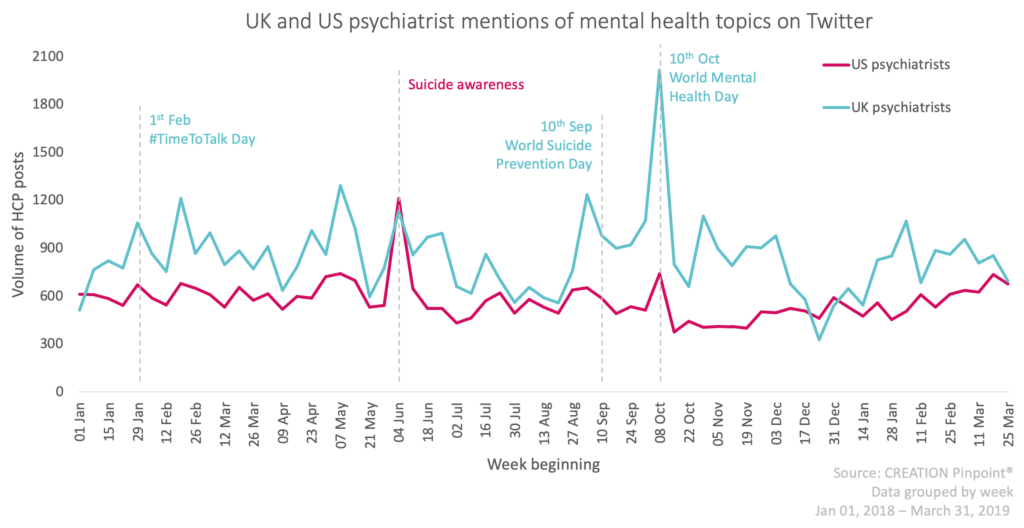
Compared to other specialists discussing their respective therapy areas, we see that psychiatrists are particularly vocal online when discussing mental health. The data shows that each contributing author wrote on average 70 posts each over the 15 month period on this topic alone. Conversations that were consistently maintained included the NHS and mental health services, children and young people, research and support. Beyond this, specific hashtag campaigns and awareness days (or weeks) drove peaks in conversation.
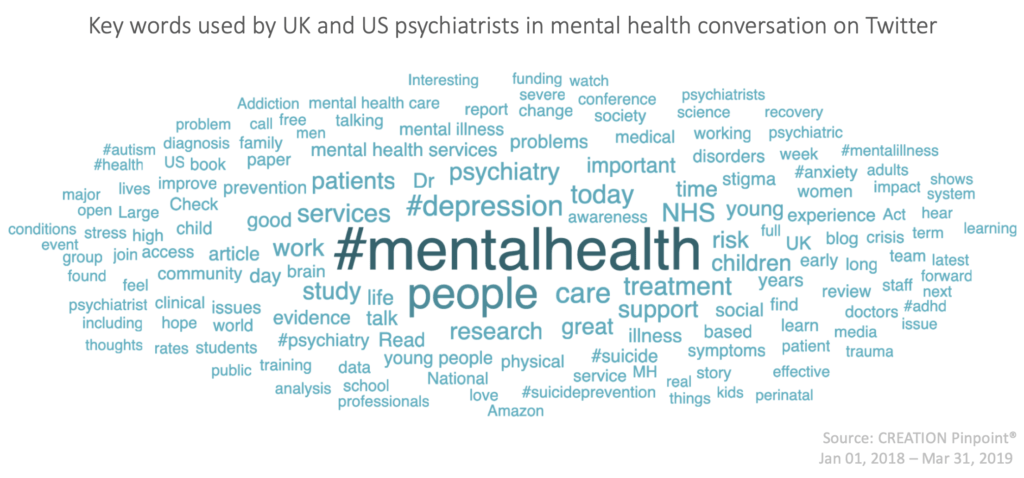
#MentalHealthMatters
Beyond simple hashtags such as #mentalhealth (16.1k mentions), #depression (5.7k mentions) and #suicide (2k mentions), a few curated mental health hashtags emerged as particulalrly popular among psychiatrists. Firstly, #MentalHealthMatters, with 875 mentions (417 in the UK). Psychiatrists used the hashtag to explain the importance of talking about mental health, with some sharing experiences from their careers to encourage conversation.
Dr Howard Liu, a psychiatrist from Nevada, encouraged those who struggle with grief to seek out help from a therapist. Voices such as these amongst flurries of individuals seeking help have the opportunity to carry great significance, particularly when they hold expertise in the area. The internet is littered with fake news, and fake medical news can be extremely damaging, especially to those who are vulnerable or not medically educated. To have trained medical professionals, and especially psychiatrists, contributing to the online mental health conversation allows those who may not have sought out medical help to reconsider their options. The difference between meeting someone where they are and expecting them to come to you could truly be life or death in many situations.
#MentalHealthAwareness
The next most used hashtag for building awareness was #MentalHealthAwareness which was tweeted (or retweeted) 785 times by psychiatrists in the UK (335 posts) and US (450 posts). Of these posts, 51% contained links to external sources, explored below.
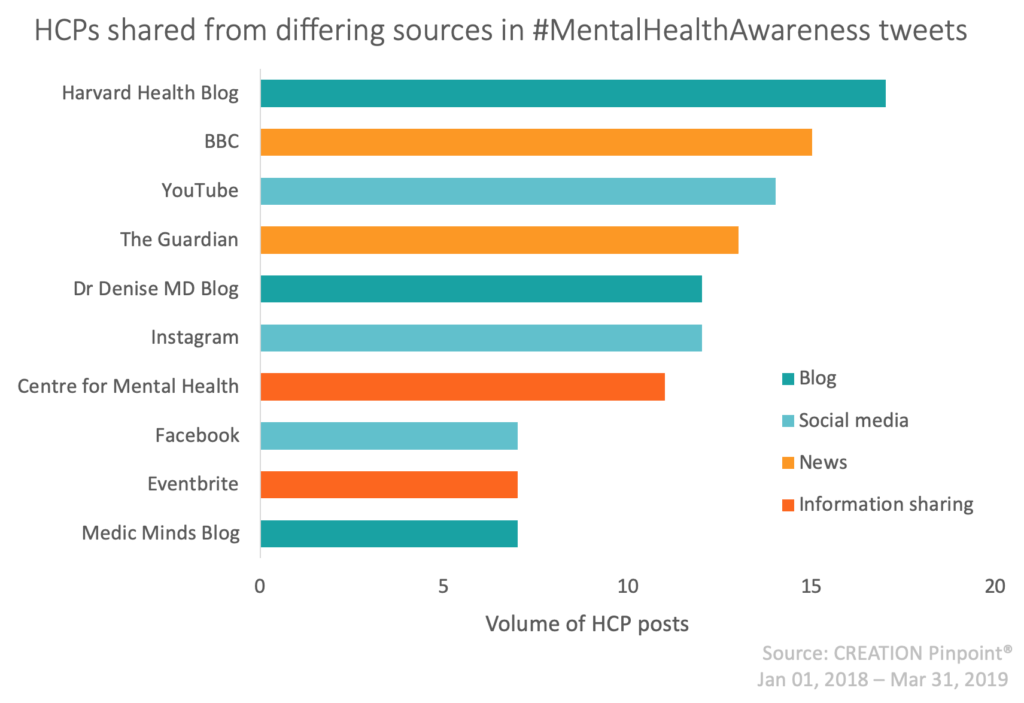
HCPs who were raising awareness also provided further information from a variety of resources. The Harvard Health blog, written by various HCPs, was popular among psychiatrists. The tweet below and attached blog post was written by Dr Srini Pillay (@srinipillay), a psychiatrist in Massachusetts, and was shared five times by other psychiatrists in the US.
#WorldMentalHealthDay
The largest volume of mental health conversation among psychiatrists occurred on 10th October, World Mental Health Day, as presented by the World Federation of Mental Health. It was an event when HCPs and non-HCPs used social media to campaign for greater mental health awareness by sharing their experiences and offering support. Across the study, the day saw a total of 820 tweets from psychiatrists. 452 posts used the hashtag #WorldMentalHealthDay, of which only 56 were from UK HCPs.
Psychiatrists used these campaigns to voice their own experiences and journeys of struggling with mental health. This is a conversation that we see continually arising, showing the impact that mental health can have on all people, even those providing treatment and support. In the overall mental health conversation, psychiatrists discussed the mental health issues that many HCPs experience, noting the stigma that doctors face might prevent them sharing or seeking help in a professional context.
#TimeToTalk
Initiated by mental health action group Time to Change, #TimeToTalk is a campaign which aims to stimulate conversation and inspire individuals to talk about mental health, to ultimately end the stigma around mental illness; the tagline of the campaign is “let’s end mental health discrimination”. This campaign was UK based, and this was reflected in the proportion of the tracked psychiatrist conversation being held among UK psychiatrists (94%, n=331 HCP posts). The graph below shows that in the overall mental health conversation from psychiatrists, 63% of the posts were retweets, but isolating the #TimeToTalk conversation a higher proportion of 88% of the posts were retweets.
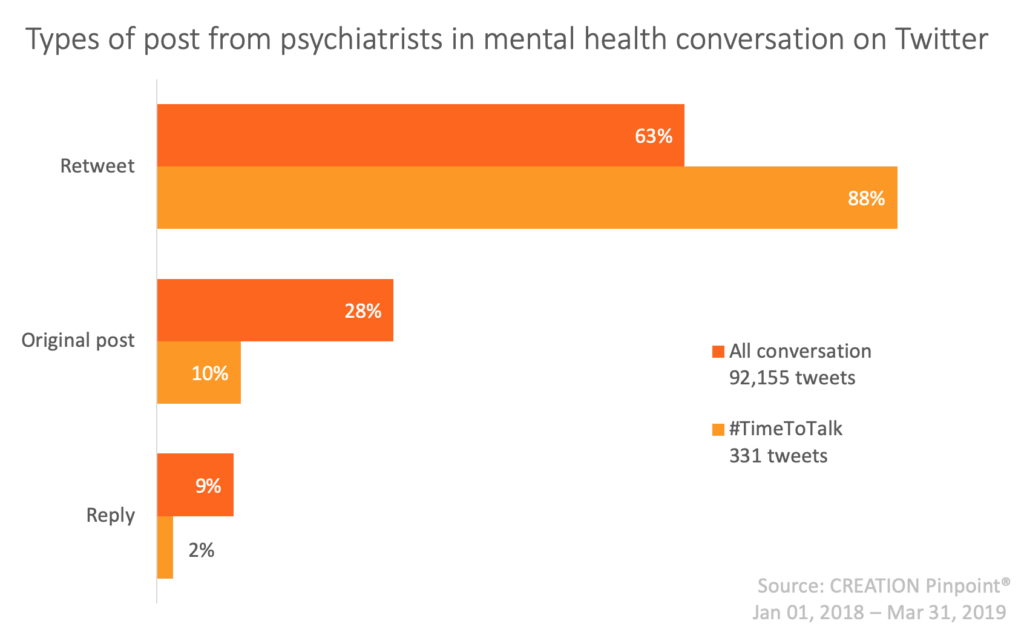
Psychiatrists are also circulating patient-facing content: Twitter accounts, @TimetoChange and @NHSuk were the most-shared accounts by psychiatrists in the #TimeToTalk conversation.
Psychiatrists respond directly to patients
As well as raising awareness, disseminating resources and sharing their own journeys, psychiatrists on Twitter also used the platform to support patients by directly responding to them. This allows for personal connections to be made, with true, straight-to-the-source advocacy.
With the mental health conversation online being added to continually, the voice of trained professionals on platforms such as Twitter will be crucial. Many psychiatrists are already placing themselves at the forefront of the conversation, sharing key information, raising awareness and supporting people at risk. We see here that hashtags can be utilised to unite Twitter users with different experiences and backgrounds who are passionate about any topic, and are particularly powerful when talking about mental health. The curation of positive messages, alongside the openness about personal struggle allows for the building of a strong community, invaluable to those who find it difficult to find help and support elsewhere.
 By Mary Kangley
By Mary Kangley 
